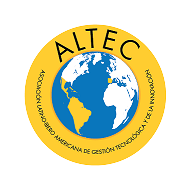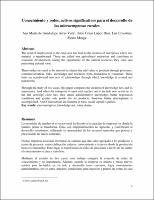| dc.contributor.author | Arras Vota, Ana María de Guadalupe | |
| dc.contributor.author | López Díaz, Julio César | |
| dc.contributor.author | Fierro Murga, Luz Ernestina | |
| dc.date.accessioned | 2021-05-27T15:55:46Z | |
| dc.date.available | 2021-05-27T15:55:46Z | |
| dc.date.issued | 2013 | |
| dc.identifier.uri | https://hdl.handle.net/20.500.13048/747 | |
| dc.description.abstract | The need of employment in the rural area has lead to the creation of enterprises where raw material is transformed. These are called non agricultural endeavors and contribute to economic development, taking the opportunity of the natural resources they own, and preserving cultural roots. These endeavors need to be inserted in chains that add value to products through processes, commercialization, links, knowledge and resources from production to consumer. These links are transformed into nets of relationships through which knowledge is created and transferred. Through the study of two cases, this paper compares the creation of knowledge nets and its importance. And when the enterprise is open and reaches out to include new actors in its net and develops close ties, they attain administrative knowledge, better negotiation conditions and greater sale points for its products, therefore better development is accomplished. And if interactions are founded in trust, social capital is gained. | |
| dc.description.abstract | La necesidad de empleo en el sector rural ha llevado a la creación de empresas en donde la
materia prima se transforma. Éstas son emprendimientos no agrícolas y contribuyen al
desarrollo económico, utilizando la oportunidad de los recursos naturales que poseen y
preservando las raíces culturales.
Dichas empresas necesitan insertarse en cadenas que dan valor agregado a los productos a
través de procesos, comercialización, enlaces, conocimiento y recursos desde la producción
hasta el consumidor. Estas ligas se transforman en redes de relaciones a través de las cuales
el conocimiento se crea y transfiere.
Mediante el estudio de dos casos, este trabajo compara la creación de redes de
conocimiento y su importancia. Además, cuando la empresa es abierta y busca nuevos
actores para incluirlos en su red, y desarrolla lazos cercanos, logra conocimiento
administrativo, por lo tanto, mejores: condiciones para negociar y puntos de venta, lo cual
1 Correo: aarras@uach.mx
2
lleva a mayor desarrollo. Además, si las interacciones se fundamentan en la confianza, se
obtiene capital social. | |
| dc.language.iso | spa | |
| dc.rights | info:eu-repo/semantics/openAccess | |
| dc.rights | Atribución-NoComercial-SinDerivadas 2.5 Perú | |
| dc.rights.uri | http://creativecommons.org/licenses/by-nc-nd/2.5/pe/ | |
| dc.subject | Microempresa | |
| dc.subject | Conocimiento | |
| dc.subject | Red | |
| dc.subject | Cadenas de valor | |
| dc.title | Conocimiento y redes, activos significativos para el desarrollo de las microempresas rurales | |
| dc.type | info:eu-repo/semantics/conferenceObject | |
| dc.relation.conferencedate | 27-31 de octubre, 2013 | |
| dc.relation.conferencename | XV Congreso Latino-Iberoamericano de Gestión Tecnológica | |
| dc.relation.conferenceplace | Porto, Portugal | |


